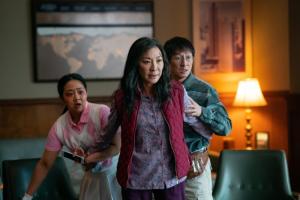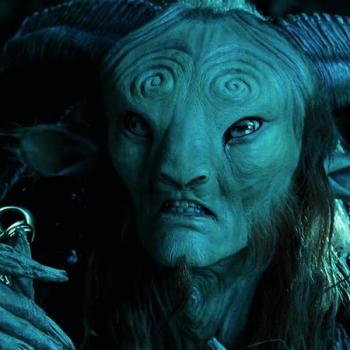
After seeing a lot of folks I respect rave about it, earlier this week I checked out Everything Everywhere All At Once, a genre-blurring sci-fi drama that’s both delighting critics and defying gravity at the box office. I have a pretty high tolerance for quasi-experimental stories like this, so I expected to really enjoy it.
Sadly, I didn’t.
(Spoilers ahead. You’re forewarned.)
In the very simplest terms, the film recounts the story of Chinese immigrant mother Evelyn (a very good Michelle Yeoh) struggling to reconnect with her daughter Joy across a dizzyingly vast multiverse rife with both absurdities and threats. The triggering event is Evelyn’s refusal to introduce Joy’s girlfriend as her girlfriend to Evelyn’s own elderly, irascible father—a lack of acknowledgement of Joy’s life choices on her terms. Shortly thereafter, when an IRS tax dispute turns into a hyperkinetic battle against extradimensional menaces, it falls to Evelyn’s husband Waymond (Ke Huy Quan, whom you may remember as Short Round from Indiana Jones and the Temple of Doom) to explain the secrets of the multiverse: it’s evidently now possible to connect the consciousnesses of a single individual across multiverses in order to rapidly obtain new skills and abilities (on the model of The Matrix).
Behind the attacks is the mysterious Jobu Tupaki (later revealed to be an iteration of Joy herself) who experiences all branches of the multiverse simultaneously and has accordingly come to reject the possibility of meaningfulness at all. If all possibilities are realized somewhere, how can anything matter? And this ultimately ends up becoming the principal theme of the film: in the face of a confusing and intrinsically meaningless world, one has the choice whether to respond with kindness and humor, or with despair.
To be sure, EEAAO does conclude with an affirmation of family relationships as, at the very least, subjectively meaningful in the face of an objective meaninglessness. But it seems to me that this misses an important point, in that the film ends up rendering meaningfulness a function of something voluntarily chosen. Conversely, I’d go so far as to say that meaningfulness as such is inevitably bound up with that which is unchosen—and that this is the great wonder and beauty of family life as such. When my parents’ arms embraced me as a child, a bond was formed between particular people in a particular moment, and those relationships are, of themselves, not interchangeable between any other “versions” of me and my family that may happen to exist in an alternate branch of the multiverse. To swap out participants in those relations, no matter how similar they may be, is to create an altogether new complex of relations, one discontinuous with the one that existed before—a complex of relations between individuals with different memories and different bodies. Near-identity is not identity, and it is within this distinction, this interval of unique particularity, that the wonder of love inheres.
In any case, I daresay this is a movie that’s difficult for anyone steeped in a tradition of religious metaphysics to really appreciate; for such a viewer, it is a film that reflects a distinctly alien orientation toward the phenomenon of the world’s givenness. And here I’m not simply complaining about the lack of a theistic element—rather pointing out that a choice between “playful nihilism” and “destructive nihilism” surely doesn’t exhaust the range of possibilities for “Being-in-the-world” in the face of apparent existential meaninglessness. What about other paths— say, perhaps, Stoic fortitude in the face of impersonal fate, or a pagan exultation in the realization of that fate? (Robert Eggers’s recent The Northman is a particularly instructive contrast here.)
I gather that there are a lot of people out there who found it deeply meaningful and profound. Nothing I say here should be interpreted to discount that. But at least on my end, I suppose how I felt is rather akin to how a Taoist must feel upon watching a film like The Passion of the Christ: I am sure there are people who find the story onscreen to be impactful, even transformative, but I can’t claim to be among them.
Honestly, that’s a pretty unique experience for me. Maybe my aesthetic palate has lost its sensitivity.
















